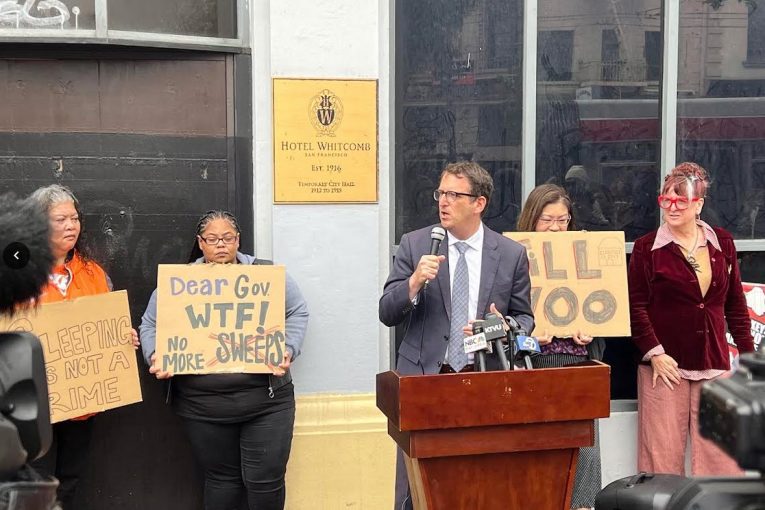
SAN FRANCISCO, CA– Recent initiatives to clear homeless encampments across California encouraged by California Gov. Gavin Newsom and San Francisco Mayor London Breed were blasted by San Francisco community leaders this week, who called for more compassionate, local-based solutions to the homelessness crisis.
David Sjostedt and Gabe Greschler for the San Francisco Standard reported in a story that in June the Supreme Court ruled that “enforcing rules against homeless people for sleeping outside doesn’t violate the Eighth Amendment’s ‘cruel and unusual punishment’ clause.”
Writer for Cal Matters, Marisa Kendall, wrote the ruling has “granted state and local authorities more power to clear encampments” because it has reversed the previous ruling of Grants Pass v. Johnson which banned cities from punishing “people for sleeping outside if they had nowhere else to go.”
Kendall reported on July 25 Newsom “ordered state agencies to remove homeless camps throughout California.”
Similarly, Sjostedt and Greschler disclosed Mayor Breed plans to begin an “aggressive” sweep of San Francisco’s homeless encampments and also plans to begin to issue “criminal penalties against homeless people.”
According to Newsom’s recent order, Kendall reports, “state agencies are to model their encampment policies around one that Caltrans has used for several years to remove camps.” Since July of 2021, Caltrans has removed 11,188 encampments according to Cal Matters.
However, Caltrans has received backlash for their policies surrounding encampment cleanups and, according to Kendall’s reporting that noted “the agency agreed to pay 5.5 million to settle a lawsuit that accused it of destroying property belonging to homeless Alameda County residents.”
The SF press conference, held to address concerns with Newsom and Breed’s plans, took place outside of Hotel Whitcomb, a hotel that is said to hold 459 unoccupied rooms that could be used to house those experiencing homelessness in San Francisco.
At the press conference, John Do, the Senior Attorney for the Racial & Economic Justice Program at the ACLU of Northern California stated that “everyone has the right to have personal property and the government cannot seize or destroy personal belongings…Newsom has endorsed Caltrans as a model for clearing encampments.
“This is concerning as Caltrans has a troubling history of destroying people’s belongings, a practice that led to a $1.3 million settlement with the ACLU and the Lawyers Committee. We’ve fought—and won—this battle before, and we will do so again.”
Julia Arroyo, the executive director of Young Women’s Freedom Center, explained homeless sweeps are inhumane and counterproductive, noting that “criminalizing homelessness only exacerbates the problem and fails to address the root causes… sweeps displace individuals without providing any sustainable solutions, leading to further instability, trauma, and often death.”
Other community leaders proposed alternative ways to address the root causes of homelessness, including the executive director of the Coalition on Homelessness, San Francisco, Jennifer Friendenbach, who stated that “elected officials must fill vacant units, expand all types of housing acquisitions, rental assistance, and new construction.”
SF County District 5 Supervisor Dean Preston echoed these thoughts, charging that “we cannot arrest our way out of the homelessness crisis which is primarily caused by economic hardship and high housing costs. We must urgently house people with the support they need, scaling up programs like Street-to-Home to fill vacant supportive housing units and meet people’s immediate need for housing.”
Overall, the community leaders present at the conference emphasized solutions must take into account the input of people experiencing homelessness.
At the conclusion of the press conference, the community leaders expressed their desire for Mayor Breed to be transparent about plans as well as “to involve community organizations in the decision making process.”
Lance Wilson said speakers at the conference “expressed a strong belief that through collaboration and a commitment to human rights, San Fransisco can create an environment where everyone has the opportunity to thrive.”